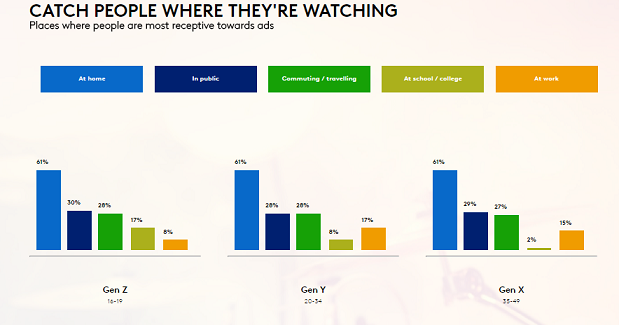 Move Over,Gen Z is Here
Move Over,Gen Z is Here
Marketers will be busy in 2017. At the top of their to-do list will be gaining a rapid understanding of the needs, aspirations and behaviours of Generation Z, also referred to as post-millennials or centennials. To be accepted by this key group, now 27% of the world’s population, marketers must develop mobile-led creative content that appeals to their imagination and passions for design and music.
Marketers will also innovate to build better brand experiences and connected consumer journeys. They will focus on developing more engaging content and using more sophisticated, brand-infused programmatic targeting and less intrusive media approaches to play their part in discouraging ad blocking.
Finally, they will take advantage of new technologies which enable cross media placements that work together to drive synergies and deliver enhanced ROI.
Marketers who most enthusiastically tackle these challenges and embrace these opportunities will be leading the way in #gettingmediaright.
Generation Z, who have grown up with a smartphone in their hand, are no on the cusp of adulthood. In order to engage with this generation and remain relevant, marketers will need to adapt quickly to the values and attitudes of this group.
Brands ramp up Gen Z efforts
After playing catch-up to evolve their approach to reach Millennials, marketers will move more quickly in 2017 to connect with Generation Z.
Gen Z, those born between 1997 and 2011, is estimated to count 2 billion members globally – approximately 27% of the world’s population. Described as frugal and brand-wary but also industrious and collaborative, Gen Z will capture a large part of a brand’s media and marketing focus and budget in the year ahead. This group will challenge not only how brands communicate, but the very notion of a brand’s authenticity and transparency in digital.
Gen Z is coming of age in a post-linear digital world. Knowledge about everything is at their fingertips and on demand whenever they want it. They’re also emerging at a time of institutional instability and consequently Gen Z presents a conundrum for brands because they place a high emphasis on personal privacy but also expect full transparency from brands.
Successful brands will embrace three paradigm shifts throughout 2017:
1. Brands will invest media dollars and focus activity in digital platforms that allow consumers to co-create a shared brand experience. Unlike the personalization coveted by Millennials, Gen Z will be hands-on – they want to try it, take it apart and re-create it.
2. Brands will give their target consumers a deeper look at themselves through owned media (social, apps, and websites).
In addition to products and services for sale, brands will share their story, their purpose and details about their production processes so Gen Z can determine if the brand’s values match their own. This narrative will be further cascaded through strategically placed branded and sponsored content.
3. Brands will shift their focus to right-brained influence.
The foundations of the internet and digital media were left brain, with a focus on the linear, factual and linguistic. Digital media for Gen Z will be right brain with a focus on imagination through augmented reality and virtual reality; non-verbal immersive formats and stronger visual imagery; and emotive through emphasizing music and narratives.
These shifts will help drive brand growth and increase the power of digital as a channel for brands to meaningfully connect with this audience.
#GettingMediaRight implication
Marketers should invest in digital platforms to offer Gen Z consumers opportunities to interact and co-create.
Transparency and imagination will be important as well as experimentation with augmented reality and virtual reality marketing to reach this highly imaginative and visual audience.

Generations matter
Creating advertising that works across generations is tough; getting Gen Z to engage is particularly tricky since they are more likely to skip online videos. Gen Z can’t easily be pigeon-holed, but in most countries they place more value on music and social media. They are a mobile-first generation, but that is not the only way to connect with them.
Media implications
Don’t underestimate the power of traditional media; Gen Z are generally more open to outdoor and TV ads than to digital ads, even though they spend more time online. Stop using invasive, non-skippable online formats which are disliked by all generations, especially Gen Z. Embrace branded content which is a more popular format. For Gen Z, make ads interactive and use innovative online formats like mobile rewards videos.
Creative implications
If Gen Z are part of your target audience, pay particular attention to music and design aesthetics. More important than any content formula for reaching Gen Z is deploying an advertising approach that they can relate to. Ultimately, engaging across all generations is more about reflecting the shared values you want to use to connect with people of all ages.

